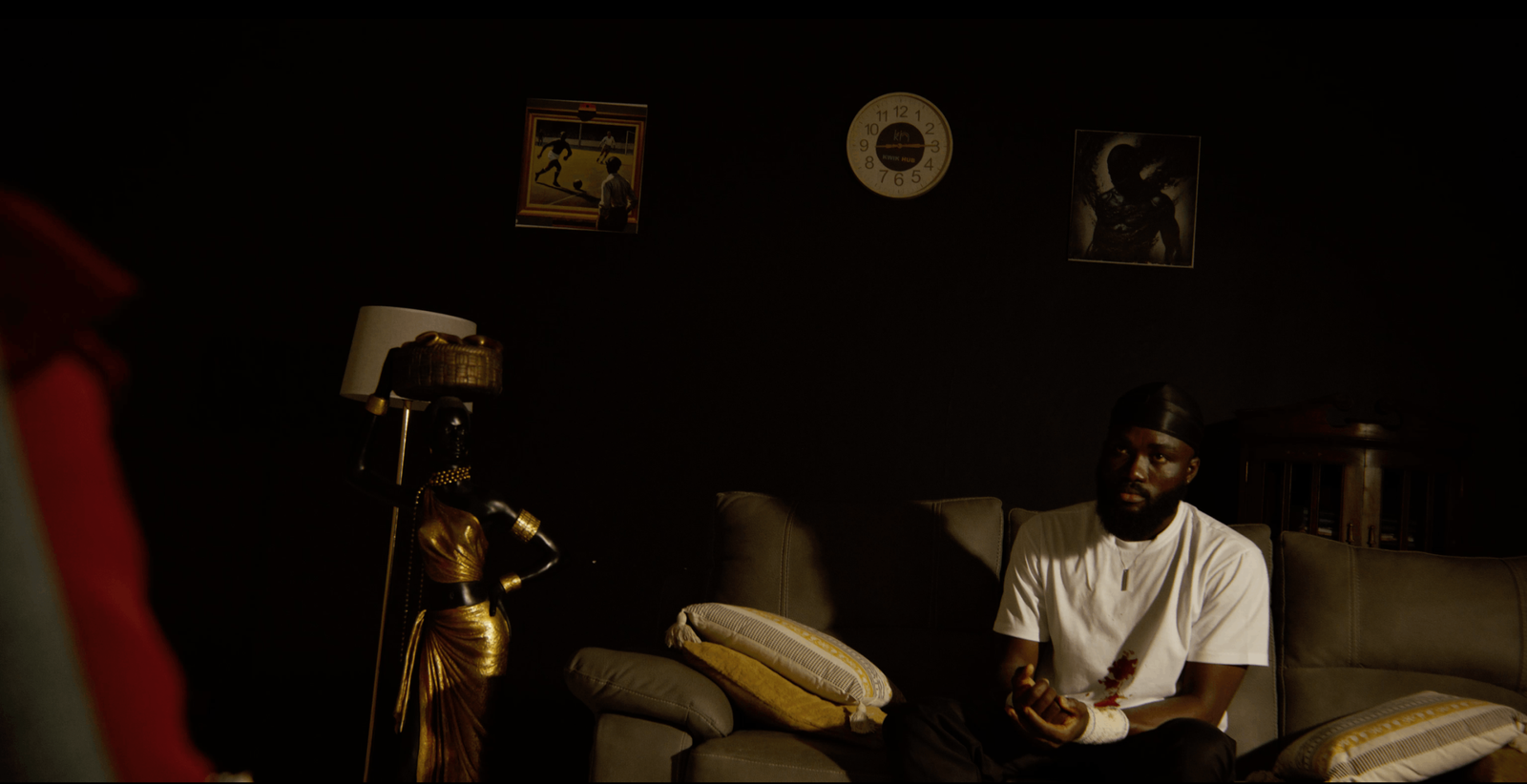Published
3 months agoon

Being a man, I dare say, doesn’t come easy at all. You are often burdened with the struggles of self-worth and identity, as well as the choices and their consequences, and the complexities of acceptance and denial. So you find a cope; something, anything, to hold onto so you don’t break under the weight of everything expected of you.
It’s within this emotional and psychological maze that the young filmmaker Gilbert Ramy Carrey positions his short film ‘Cope‘, taking a bold stab at a subject as complex and multilayered as the inner turmoil of the African man.
The short tells this story through Abebrese (played by Prince Annan), a young man who wakes up in a therapist’s office after attempting to take his own life. Confused, disoriented, and emotionally fragile, he soon finds himself locked in a tense and revealing conversation with a mysterious Therapist (played by Ursula Galyuoni Kennedy), who oddly seems to know far too much about him. As the dialogue unfolds, Abebrese is pushed to confront the problems and pressures that drove him to the edge, forcing him to see his own life from a completely new and unsettling perspective.
The entire 15-minute runtime of ‘Cope‘ takes place inside this therapist’s office. It is just the two of them, Abebrese and this enigmatic Therapist, caught in a conversation neither of them can escape. The film relies on their interaction to carry its narrative, and it works to keep the viewer locked in step with Abebrese’s unravelling state of mind.
The film opens creatively, with what sounds like Abebrese flatlining as his name is repeatedly called out. That effect alone places the viewer in uncertainty before the first frame even settles. Then he jolts awake in a strange place. Perhaps, just perhaps, he is lingering at the crossroads between life and death after choosing to end his own existence. It is a bold opening for a short film, one that sets the stage for a journey that isn’t physical but entirely psychological.
As the narrative progresses, it becomes increasingly convincing that all of this could very well be an existential experience taking place within Abebrese’s subconscious. We, the viewers, may be witnessing the mental struggle of a man suspended between giving up and fighting to live.
Their interaction slowly unveils what may have led Abebrese to this breaking point. He carries deep resentment toward his parents. Not just for refusing to let him marry the woman he loves, but for their constant interference in all his life choices. Even his dream of playing football professionally was tampered with. Everything he hoped to be or become was filtered through someone else’s expectations.
Just like the narrative itself, Abebrese has a lot to unpack, yet the space he finds himself in doesn’t exactly feel safe enough for that vulnerability. Still, he is forced into introspection and self-confrontation. Will he break further and cross over in despair, or will he cling to whatever resilience he has left?
“Talking is a good way to better understand ourselves and our decisions…” The Therapist uses this line to coax Abebrese into opening up. Her demeanour functions as more than a voice of reason. She becomes a sharp, almost intrusive echo of his internal turmoil. At the same time, she is a harsh yet necessary awakening, urging him to face the very things he has spent years running from.
Technically, ‘Cope‘ keeps things modest. There is a clear attempt to create cinematic and emotionally charged visuals using lighting and shadows. Does it work? Not entirely. The lighting sometimes sets the tone well, but several shots are too widely framed, revealing too much of the modest set when tighter framing could have drawn us closer to Abebrese’s emotional state, capturing the nuances of his facial expressions and the weight of his mannerisms.
The same can be said about the sound design. I believe the intention was to immerse us in the strange space Abebrese occupies as he drifts between consciousness and blackout, life and death. But that sensation doesn’t land as strongly as it could have. There was room for more atmospheric layering to make that psychological space feel more immersive.
The actors, however, do well with the material they are given. Their performances hold together decently, even though the laborious task of memorising dialogue occasionally shows through in their delivery. Still, they give enough to keep you attentive from start to finish. Their understanding of the narrative is evident in the commitment they bring to their characters.
Abebrese, in particular, comes across convincingly as a broken man, regretful, resentful, and deeply wounded by those he believes placed him in this dark corner of his life. The Therapist, on the other hand, stands firm as his moral compass, guiding him through this psychological journey with a blend of firmness, condemnation, compassion, and clarity.
In the end, we all have a cope. We all find ways to rationalise or mask our disappointments, rejections, and regrets. But the film subtly asks if we really do need these copes. Or should we sometimes face life exactly as it is thrown at us?
I will score ‘Cope‘ 3.5 out of 5 stars. Whatever it may lack technically, it makes up for in intention. It takes the viewer on a necessary introspective journey that forces you to pause and ask yourself whether, just like Abebrese, you are allowing others to dictate your path, simply to avoid making difficult decisions for yourself. It leaves you with enough to reflect on about choices, consequences, regrets, and the uncomfortable truth that sometimes we are complicit in our own unhappiness.
The issues ‘Cope’ tackles are not peculiar to men alone, but it is refreshing to see them handled from a man’s perspective. More films like this need to be made regardless. Stories that speak up for the typical African man, his mental struggles, and his unspoken traumas. Hopefully, more young filmmakers like Gilbert Ramy Carrey continue to boldly explore these themes through African cinema.
Second on my list of addictions is Movies.. the only thing I could possibly love more is my Dearest Waakye lol. Nothing else does a better job of reminding me that ANYTHING is possible with the right amount of effort. I have great eye for details and flaws in scripts. Shallow scripts bore me. I am an avid reader. Your everyday Mr Nice guy. Always the last to speak in a room full of smart people. Half Human, half Martian but full MOVIE FREAK.














